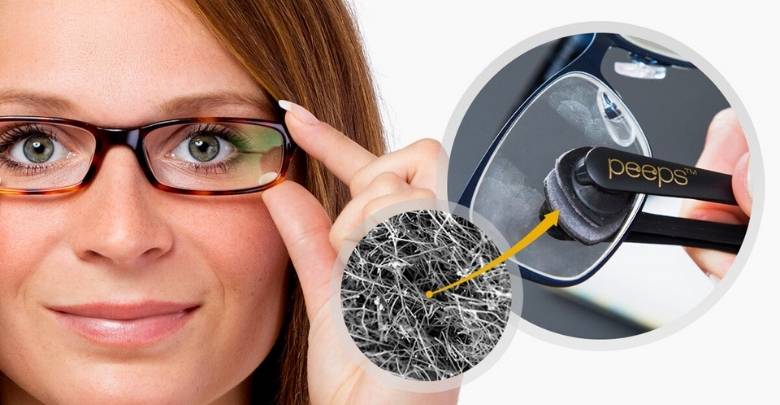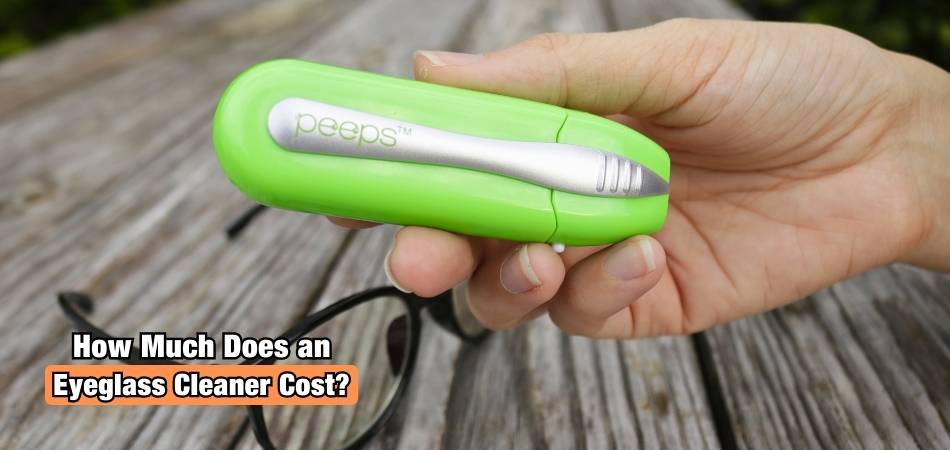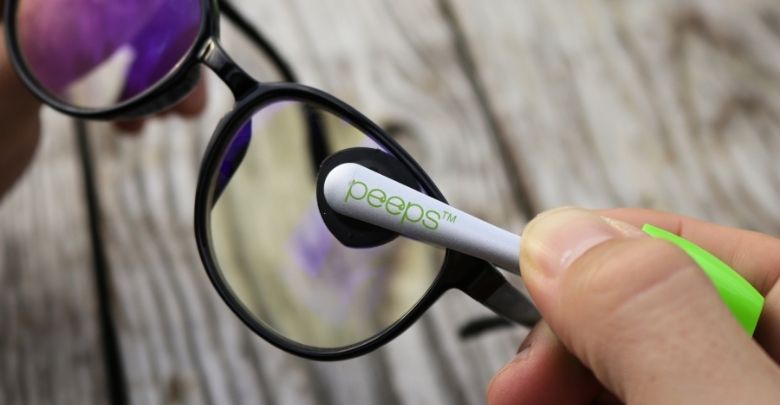A common tool for keeping eyesight clear is an eyeglass cleaner. They come in various forms, from sprays to wipes, and are designed to keep your lenses free from dust, smudges, and oils. With the growing need for effective and easy cleaning, many people rely on these products daily. However, you might be wondering: How much does an eyeglass cleaner cost?
The price of an eyeglass cleaner typically ranges from $5 to $20, depending on the type and brand. Spray cleaners usually cost between $15 and $20, while pre-moistened wipes and small travel-sized bottles tend to be more affordable. Premium brands or specialized cleaners for lens coatings can cost up to $25.
Are you curious about the factors that influence the cost of eyeglass cleaners or wondering which one is best for your needs? Keep reading, as this article provides all the necessary information to help you make an informed decision.
Importance of Keeping Your Eyeglasses Clean
To preserve good vision and general eye health, you must keep your glasses clean. Dust, fingerprints, and smudges can easily accumulate on the lenses, leading to blurred vision and discomfort. Without proper cleaning, these particles can even scratch the lens surface, reducing the quality of your glasses over time.

Regular cleaning of your eyeglasses not only ensures clarity but also prolongs the life of your lenses. Accumulating dirt can wear down the coating on your glasses, causing damage and eventually leading to costly repairs or replacements. Cleaning them frequently helps protect the lenses and keeps them in top condition for a longer period.
In addition to physical damage, dirty lenses can cause eye strain. When smudges or dust block your vision, your eyes have to work harder to focus. This can lead to discomfort and headaches, making it harder to use your glasses for long periods, especially when studying or reading.
For a quick and effective solution to keeping your eyeglasses clean, consider using products like Peeps by Carbon Klean. It is a convenient and easy-to-use tool designed to remove dirt and oils from your lenses, ensuring that your glasses stay clear without any hassle.
How Much Does an Eyeglass Cleaner Cost?
Maintaining sharp vision and prolonging the life of your glasses require the use of eyeglass cleaners. Knowing their costs involves exploring various options, materials, and benefits. Below, you’ll find detailed information about what influences their prices and what to consider.

Type of Eyeglass Cleaner
Different types of eyeglass cleaners meet various cleaning needs. Spray solutions typically cost $5 to $20 for mid-sized bottles. Pre-moistened wipes, often sold in packs, range from $3 to $10 depending on quantity. Gels, designed for deeper cleaning, may cost $8 to $20 per bottle. Choosing the right type ensures you spend wisely without compromising on performance.
Ingredients and Formula
The cost of eyeglass cleaner varies according to its ingredients and efficacy. Alcohol-based solutions are often affordable, with prices from $10 to $20. Hypoallergenic cleaners, designed for sensitive users, might cost between $10 and $18 due to specialized formulas. Advanced options, such as anti-static or anti-fog cleaners, can go up to $25. Investing in the correct formula protects your lenses and fits your budget.
Brand and Manufacturer
An important factor in the price of eyeglass cleaner is brand reputation. Premium brands like Carbon Klean may charge $20 per bottle for their trusted quality. Generic brands or lesser-known manufacturers offer affordable options, ranging from $10 to $15. Balancing brand reliability with cost ensures you get effective cleaning without overspending.
Packaging and Size Options
Value and price are directly impacted by packaging size. Small travel-sized bottles, priced between $5 and $10, are great for portability. Mid-sized bottles for home use typically cost $10 to $15 and last longer. Bulk packs, priced from $20 to $35, provide cost-effective options for heavy users. Opting for larger sizes reduces per-use expenses over time.
Accessories Included
Cleaners bundled with accessories often have varied prices. Kits with microfiber cloths cost $10 to $20 depending on quality and extras. Premium kits with tools like brushes or lens cases can go up to $30 or more. While accessories increase prices, they add convenience and make cleaning hassle-free. Choosing bundles helps maximize value for the price.
Lens Type and Coatings
Cleaners safe for specialized lenses affect costs due to specially designed formulas. Products labeled safe for anti-reflective or blue-light coatings start at $10 and can go up to $25. Standard lens cleaners are more budget-friendly, often costing $5 to $12. Spending a little more on compatibility prevents damage to expensive lenses.
Retailer and Purchasing Location
Where you buy the cleaner impacts the price significantly. Physical stores usually sell cleaners for $10 to $15 due to operational costs. Online platforms often offer discounts, with prices starting at $5 but adding $3 to $7 for shipping. Wholesale stores provide bulk deals, ranging from $20 to $40 for multi-packs. Comparing sources helps you save money without compromising quality.
Frequency of Use and Budget
The frequency of eyeglass cleaning determines your total spend. Occasional users might spend $5 to $10 for small bottles lasting months. Regular users, who clean daily, benefit from $20 to $30 bulk packs or refill options. Budgeting based on cleaning habits helps balance immediate costs with long-term savings.
Selecting the right eyeglass cleaner protects your lenses and fits your budget. Considering price factors ensures quality and value for your money. Explore options thoughtfully and enjoy clearer vision while saving wisely.
Key Factors to Consider When Choosing the Best Eyeglass Cleaner
A good eyeglass cleaner should consider several factors to ensure your lenses remain clear and protected. A good eyeglass cleaner should not only be effective but also safe for the lens coating. Below, we’ll explore the key factors you need to know.
Cleaning Effectiveness
The effectiveness of the cleaner is the most important factor to consider. A good cleaner should easily remove dust, dirt, and smudges from your lenses without leaving streaks or residue. Make sure to choose a cleaner that is gentle but effective, ensuring it does not scratch or damage the lens surface.
Lens Compatibility
Not all eyeglass cleaners are suitable for every type of lens. Some lenses have special coatings, like anti-reflective or anti-scratch coatings, which require specific cleaners to prevent damage. Be sure to check if the cleaner you choose is compatible with your lens type for the best results.
Convenience and Portability
Choosing a cleaner that’s easy to carry around is another key consideration. A compact cleaner that fits in your bag or pocket can be convenient for cleaning your glasses on the go. Portable options, like wipes or small spray bottles, make it easy to keep your glasses clean wherever you are.
Safety and Ingredients
Consider the ingredients in your eyeglass cleaner. Some cleaners may contain harsh chemicals that can damage your lenses or coatings. Check for gentle, non-abrasive ingredients that are safe for your glasses. In that case, knowing the pros and cons of eyeglass cleaners can help you select one that’s both effective and safe.
Price and Value
While price shouldn’t be the only deciding factor, it’s still important to choose a cleaner that provides good value. Some high-end cleaners can be expensive, but they may offer extra features like antibacterial properties or eco-friendly ingredients. Choose one that fits your budget and meets your needs.
Finding the best eyeglass cleaner involves balancing effectiveness, safety, and convenience. Make sure to pick a cleaner that suits your lens type and cleaning needs to ensure clear vision and protect your eyewear investment.
Common Mistakes to Avoid When Using Eyeglass Cleaners
Properly cleaning your eyeglasses ensures clearer vision and extends the life of your lenses. Avoiding common mistakes when using eyeglass cleaners helps achieve better results and prevents damage. Here are key mistakes to be mindful of.
- Using Harsh Chemicals: The lifespan of lens coatings can be shortened by using cleaners that contain harsh chemicals. Opt for cleaners that are specifically designed for eyeglasses to maintain their quality and clarity.
- Rubbing Lenses Too Risky: Aggressively rubbing lenses can scratch the surface and cause irreversible damage. Always clean your glasses gently with a soft cloth to avoid damaging the lens material.
- Not Cleaning Cloth Regularly: Dirty cleaning cloths can transfer dirt, oils, and dust back onto your lenses. Wash your clothes regularly to maintain their effectiveness and prevent streaks or scratches.
- Using Paper Towels or Tissues: Avoid using paper towels or tissues as they can be abrasive, leaving scratches on your lenses. Soft microfiber cloths are better suited for cleaning glasses without causing harm.
- Spraying Cleaner Directly on Lenses: If you spray cleaner straight onto your lenses, too much liquid may drip into the frames. Instead, spray the cleaner onto the cloth first and then wipe the lenses.
- Using Eyeglass Cleaners for Other Surfaces: Eyeglass cleaners are designed for delicate lenses and may not be suitable for other surfaces. Use cleaners meant for your glasses only to avoid unwanted effects on different materials.
- Storing Lenses Without Proper Protection: Leaving your glasses unprotected when not in use can lead to scratches or other damage. Always store them in a protective case to keep them safe from dust and impacts.
- Not Drying Lenses Properly: After cleaning, leaving lenses wet or damp can lead to streaks or water spots. Always ensure your lenses are dry by wiping them gently with a clean cloth.
- Ignoring Lens Coatings: Some eyeglasses have coatings that require special care. Be aware of the type of coating on your lenses and avoid cleaners that could harm them.
- Not Cleaning Glasses Regularly: If you do not clean your glasses regularly, dirt and oil will accumulate. Regular cleaning ensures your lenses remain clear and functional, enhancing your overall vision.
When using eyeglass cleaners, it’s crucial to be mindful of simple yet impactful mistakes. By following proper cleaning practices and knowing the dos and don’ts, you can maintain the clarity and longevity of your glasses effectively.
How to Use an Eyeglass Cleaner Effectively?
To keep your lenses clear and long-lasting, you need to use eyeglass cleaners. However, many people may not be using them to their full potential. Proper cleaning techniques can make a big difference in how well your glasses stay in top condition. Below, you’ll find a few tips to ensure effective cleaning.

Use a Clean Microfiber Cloth
Microfiber cloths are specifically designed to clean lenses without scratching them. Always ensure your cloth is clean and dry before use, as dirt or debris on the cloth could cause scratches. This gentle cleaning method helps maintain your glasses.
Apply Cleaner to the Cloth, Not the Lens
When using an eyeglass cleaner, it’s better to apply it directly to the cloth rather than the lenses. This prevents any excess cleaner from dripping down onto the frame or into the lenses. Applying cleaner in this controlled manner ensures your glasses are properly cleaned without wasting product.
Avoid Harsh Chemicals
Over time, the coating on your lenses may be harmed by harsh chemicals or household cleaners. Always opt for a cleaner that is specifically formulated for eyeglasses. These specialized cleaners are gentle and designed to preserve the lens coating, making them more effective.
Clean Regularly but Gently
Clean your glasses regularly to avoid the buildup of oils and smudges. However, over cleaning with excessive force can damage both the lens and the frame. A gentle, consistent cleaning routine ensures your glasses remain clear without unnecessary wear.
Store Glasses Properly After Cleaning
After cleaning, make sure to store your glasses in a protective case to keep them safe from scratches, dust, or other damaging factors. Proper storage ensures your lenses stay clean for longer, and it also helps preserve the effectiveness of your cleaner.
Using the right techniques and tools can make a big difference in keeping your eyeglasses in good condition. With the proper care, your glasses can remain clear, and the lifespan of glasses cleaner can be extended as well.
FAQs About How Much Does an Eyeglass Cleaner Cost?
Eyeglass cleaners are essential tools for maintaining clear vision and extending the life of your glasses. Below are some common questions and answers about their costs to help you make the best choice for your cleaning needs.
Are There Budget-Friendly Eyeglass Cleaner Options?
Yes, there are several budget-friendly options available. Generic brands or smaller bottles of spray solutions often cost between $10 and $20. Pre-moistened wipes are also affordable, with packs available for under $10. These options provide effective cleaning while being economical for occasional users or those with minimal cleaning requirements.
What Is The Average Cost Of Premium Eyeglass Cleaners?
Premium eyeglass cleaners typically cost $10 to $25, depending on the brand and formula. These cleaners often include advanced features like anti-static or anti-fog properties. They are designed to offer better performance and compatibility with coated lenses, making them a worthwhile investment for those seeking high-quality products.
Do Eyeglass Cleaner Kits Offer Better Value?
Yes, eyeglass cleaner kits can offer better value. Kits that include spray cleaners, microfiber cloths, and other accessories are priced between $10 and $30. While the initial cost might be higher, these bundles provide added convenience and long-term cost savings by including multiple cleaning essentials.
Does Packaging Size Impact The Price Of Eyeglass Cleaners?
Yes, the size of the packaging significantly impacts the price. Small travel-sized bottles cost $5 to $10, while mid-sized bottles range from $10 to $15. Bulk packs or larger bottles, priced from $20 to $35, are ideal for heavy users, reducing the overall cost per use.
Are Online Discounts Available For Eyeglass Cleaners?
Online platforms often offer discounts on eyeglass cleaners, with prices starting as low as $5. However, shipping fees, usually between $3 and $7, can affect the final cost. Comparing prices across multiple websites helps you find the best deals and save money on quality products.
Closing Remarks
Keeping your eyeglasses clean is essential for maintaining clear vision and prolonging the life of your lenses. By understanding the different types of cleaners, their features, and how they fit your needs, you can make informed decisions to protect your eyewear.
When asking, how much does an eyeglass cleaner cost? The price typically ranges from $5 to $20, depending on the type, brand, and additional features like anti-fog or hypoallergenic properties. Bulk packs and eco-friendly options might cost more initially but provide better value over time.
Always choose a cleaner that matches your lens type and cleaning habits. Remember to clean gently, store glasses properly, and prioritize products designed for eyeglasses. Best wishes for clearer vision and well-maintained lenses!






